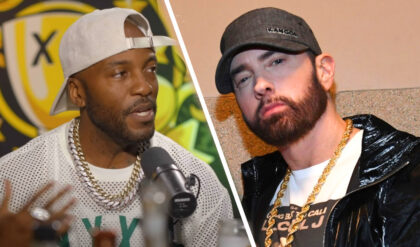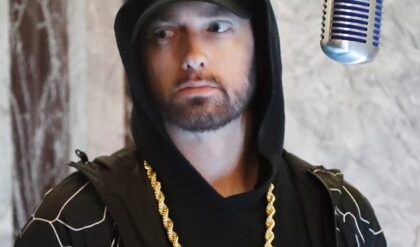Sean “Diddy” Combs could be “fighting for his life” amid federal and sex crimes charges, according to legal experts.
New York police on Monday arrested the embattled media mogul, who has spent the past year fighting several civil lawsuits with alleged victims over misconduct claims that span three decades. The following day, the U.S. Attorney’s Office for the Southern District of New York announced Combs is facing charges of sex trafficking, racketeering and transportation to engage in prostitution.
The charges detailed in a 14-page federal grand jury indictment, which was unsealed on Tuesday, revealed an extensive and ongoing federal investigation into the hip-hop icon. Investigators say the 54-year-old elaborately schemed to use his finances and status in the entertainment industry to “fulfill his sexual desires” in a “recurrent and widely known” pattern of abuse.
Combs has maintained his innocence in the face of the civil lawsuits and on Tuesday pleaded not guilty to all charges; he will remain in jail until trial.
Federal prosecutors have gathered enough evidence to procure a grand jury indictment against Combs. But what does that mean for his upcoming legal battle — and, ultimately, his career and reputation? Experts are weighing in on the severity of the charges and the possible fate of the music industry’s self-proclaimed “bad boy.”
Diddy indictment unsealed: What is a grand jury?
In criminal cases, a grand jury assesses evidence provided by the prosecution in a private court proceeding and determines whether there is probable cause to put a defendant on trial. If the grand jurors, consisting of between 16 to 23 people, believe there is enough evidence that a defendant committed a crime, an indictment can be filed in the court.
Sean ‘Diddy’ Combs denied bailafter pleading not guilty to sex trafficking charges
In Combs’ case, U.S. Attorney Damian Williams said the evidence supporting his indictment “includes records obtained pursuant to over 300 grand jury subpoenas and other voluntary productions.” Williams’ detention letter, which asked the judge for Combs to be put in jail prior to his trial, levied claims that suggest victim tampering, including efforts to “conceal” his actions with victims who received grand jury subpoenas to support the prosecution’s investigation.
Information presented by prosecutors includes subpoenaed witnesses who appear before the grand jury. U.S. attorneys have not made public the identities of the witnesses they summoned to court.
Investigators have taken in more than 90 cellphones, laptops, cloud storage accounts as well as at least 30 storage devices. They issued more than 300 grand jury subpoenas to obtain this evidence from communications providers, tech and social media companies, financial institutions and Combs’ companies.
Attorneys have video evidence, dozens of witness accounts about Diddy’s ‘freak offs’ and more
Prosecutors say they have “dozens” of videos depicting Combs’ so-called “freak offs” – sometimes dayslong sex performances between sex workers and people he allegedly coerced into participating through narcotics and intimidation – that corroborate witness testimony. Combs and the alleged victims “received IV fluids to recover from the physical exertion and drug use,” according to the grand jury indictment.
The indictment also states Homeland Security Investigations agents procured drugs and more than 1,000 bottles of baby oil and lubricant that were allegedly used in Combs’ “freak offs” in the March 25 raids of Combs’ homes. Multiple AR-15 rifles and large-capacity magazines were also allegedly discovered.
The wealth of evidence prosecutors say they have against Combs is one reason why Anna Cominsky, associate professor of law and director of the Criminal Defense Clinic at New York Law School, believes the defense has “an uphill battle” ahead of them.
Combs’ federal case is substantively different from “the he-said-she-said that you see in some sexual assault or sexual abuse cases where it’s the defendant’s word against the victim’s word and vice versa,” she tells USA TODAY. “We’re talking about the potential for there to be dozens of people coming into court testifying about this alleged conduct.”
“Dozens of victims and witnesses have provided detailed, credible, and corroborated information against the defendant. These individuals include many who personally experienced and witnessed violence and other crimes at the hand of the defendant,” Williams wrote in a Sept. 17 letter to a U.S. magistrate judge in which he argued for Combs to be jailed until he is brought to trial. “Moreover, their accounts are well corroborated by significant extrinsic evidence.”
What’s happened so far:Diddy will remain in jail after pleading not guilty to charges
Racketeering meaning: Why is Diddy facing RICO charges?
The racketeering charge against Combs is “very serious,” Cominsky says, “because what they’re alleging is not just that Mr. Combs engaged in illegal activity, but that he did so as part of a greater enterprise.”
But what is racketeering? It is the participation in an illegal scheme and the Organized Crime Control Act of 1970 established the Racketeer Influenced and Corrupt Organizations Statute, or RICO, as a way for the U.S. government to prosecute organizations contributing to criminal activity.
Diddy is accused of sex ‘freak off’parties, violence, abuse. What happened to ‘transparency’?
RICO tries to “capture all the inner workings of these organizations, which in and of themselves may not be criminal, but then, when put together, are in furtherance of criminal activity of this criminal enterprise,” Cominsky says.
Per Combs’ indictment, prosecutors say his racketeering activity included “multiple acts of kidnapping,” arson, bribery, witness tampering, forced labor, sex trafficking, transportation for the purposes of prostitution and distribution of narcotics.
Sex trafficking, RICO case ‘can’t get much worse’: Does Diddy compare to R. Kelly?
Combs’ trial, slated to take place in the Southern District of New York, will be legally challenging, New York-based criminal defense attorneys say.
“It can’t get much worse,” says Julie Rendelman, a New York City-based criminal defense lawyer and former prosecutor. “The feds don’t usually raid someone’s home unless they think they’re going to find something and more importantly, they don’t indict unless they think they have the goods.”
Authorities similarly brought high-profile racketeering charges against disgraced R&B superstar R. Kelly, who is serving a more than 30-year sentence for sex trafficking and racketeering, among other charges. He was tried and convicted of heading a criminal enterprise that sexually exploited people, including minors, throughout his career.
“R. Kelly and Combs are alleged to be the head of these criminal enterprises, which means there were other individuals working underneath or for that (organization). That’s what makes up the idea of a criminal enterprise,” Cominsky says. She adds that this “is different from a single or multiple allegations of a sexual assault or criminal sexual activity against an individual where it’s just that single individual who is alleged to have engaged in that criminal activity.”

The racketeering charge is so significant, Cominsky says, that “I don’t see any need for them to bring any other charges for it to get any more serious. She continued: “The racketeering charge alone carries with it the potential for a life sentence, as does the sex trafficking. So you’re talking about some of the most serious offenses.”
Matthew Galluzzo, a former prosecutor who pursued sex crimes cases and currently works as a New York criminal defense attorney, agrees.
Galluzzo posits that Combs’ alleged criminal activity “has been researched for months — maybe years — they’ve investigated this case.”
Federal prosecutors “don’t bring cases unless they believe they’re going to win,” Rendelman says, explaining that investigations into cases like Combs’ require extensive access to witnesses and information from various agencies obtained by subpoenas.
Federal sex trafficking cases carry at least a 15-year mandatory minimum sentence, and Combs is “potentially facing even longer than that,” Galluzzo says. The maximum penalty for a federal sex trafficking charge is life in prison and a $250,000 fine.
“(Prosecutors are) going to want a long sentence for Sean Combs,” Galluzzo says.
How will this impact Diddy’s career, reputation?
Galluzo believes if Combs is found guilty, the Bad Boy Records founder will “probably die in prison. There’s a good chance of it. He’s fighting for his life.”
“There’s certainly not going to be a music career if he’s convicted,” Rendelman says.

Two judges have denied Combs’ requests to be released from federal custody on a $50 million bond, reportedly due to the risk of witness tampering and obstruction in his case. This also makes fighting Combs’ charges more difficult for his lawyers, Cominsky says.
Combs “is going to be fighting this from inside a jail cell,” according to Cominsky. “And it is extremely difficult to assist a client when they are incarcerated. You just don’t have the access to them. They don’t have the access to you that you have when they are out. And that is a huge hurdle.”
Before his legal woes started, the MTV Video Music Awards celebrated Combs’ “unparalleled” career by presenting him with the Global Icon Award in September 2023. Days later, the Harlem-born Combs received a ceremonial key to New York City in a ceremony that was timed to the release of his latest record, “The Love Album: Off the Grid.”

But two months later, Combs’ ex-girlfriend Cassie Ventura opened a floodgate for civil cases against Combs when the singer sued him for years of alleged abuse. At least a half dozen civil suits have been filed against Combs since.
Galluzzo sees the damage to Combs’ career as irreversible, regardless of the trial’s outcome. “Is he ever going to work again if he wins this case? The allegations are pretty disturbing and pretty terrible,” he says.





